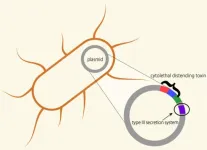(Press-News.org) Scientists have discovered toxic ‘Forever Chemicals’ present in samples of drinking water from around the world, a new study reveals.
Researchers found 10 ‘target’ PFAS (perfluoroalkyl substances) – chemicals which do not break down in nature – in tap and bottled water available for consumption in major cities in the UK and China. Perfluorooctanoic acid (PFOA) and perfluorooctane sulfonate (PFOS) were detected in over 99% of samples of bottled water sourced from 15 countries around the world.
They observed significant differences in PFAS concentrations between tap water samples from Birmingham, UK, and Shenzhen, China, with Chinese tap water found to have higher concentrations of PFAS compared to UK tap water.
However, the study demonstrates that measures such as boiling and/or activated carbon filtration – typically using a ‘jug’ water filter - can substantially reduce PFAS concentrations in drinking water, with removal rates ranging from 50% to 90% depending on the PFAS and treatment type.
Publishing their findings today (17 October) in ACS ES&T Water, researchers from the University of Birmingham, Southern University of Science and Technology, Shenzhen, and Hainan University, Haikou, reveal a wide range of PFAS contamination for target PFAS, starting at 63% of bottled waters tested.
Co-author Professor Stuart Harrad, from the University of Birmingham, commented: “Our findings highlight the widespread presence of PFAS in drinking water and the effectiveness of simple treatment methods to reduce their levels. Either using a simple water filtration jug or boiling the water removes a substantial proportion of these substances.
“While current PFAS levels in most water samples are not a major health concern, ongoing monitoring and regulation are crucial to protect public health. We provide valuable data on the presence of PFAS in drinking water alongside practical solutions to mitigate consumer exposure via drinking water. This is a significant step towards ensuring safer drinking water for communities worldwide.”
Bottled water from various countries showed varying levels of PFAS, with natural mineral water containing higher concentrations than purified water, but the concentrations were generally below health advisory levels set by regulatory agencies.
Co-author Professor Yi Zheng, from Southern University of Science and Technology, commented: “Increased awareness about the presence of PFAS in both tap and bottled water can lead to more informed choices by consumers, encouraging the use of water purification methods.
Our findings also suggest that the potential health risks of PFAS in drinking water may be influenced by lifestyle and economic conditions, highlighting the need for future research to further explore these factors from a socio-economic perspective.”
Except for comparisons between natural mineral and purified water, the researchers observed no significant difference in target PFAS concentrations between glass and plastic or still and sparkling bottled water.
While concentrations of most individual PFAS were well below corresponding health-based reference values, average PFOS concentrations in tap water samples from Shenzhen, China exceeded the maximum contaminant level (MCL) of 4 ng/L newly promulgated by the US Environmental Protection Agency (USEPA) in 2024.
Researchers purchased 112 bottled water samples from local shops and online supermarkets in the UK and China including 89 still and 23 sparkling waters in either plastic or glass bottles. The samples covered 87 brands with water sources originating from 15 countries in Asia, Europe, North America, and Oceania
They collected 41 tap water samples from homes in Birmingham and the nearby cities of Worcester, Coventry, and Derby - provided by two suppliers: South Staffordshire Water and Seven Trent Water, with a further 14 tap water samples collected from homes in Shenzhen, China.
PFAS are used widely in industry, in fire-fighting foams, and consumer products from waterproof clothing and school uniforms to personal care products because of their water and stain repellent properties. While some have been banned by government regulation, others are still widely used and their toxic effects not yet fully investigated.
The chemicals are already known to enter the body in different ways, for example being breathed in, ingested via food or drinking water, or absorbed through the skin. They are known to cause adverse health effects such as a lowered immune response to vaccination, impaired liver function, decreased birth weight, and increased risk of some cancers.
ENDS
For more information or an embargoed copy of the paper, please contact Tony Moran, International Communications Manager, University of Birmingham on +44 (0)782 783 2312 or t.moran@bham.ac.uk. For out-of-hours enquiries, please call +44 (0) 121 414 2772.
Notes to Editors
The University of Birmingham is ranked amongst the world’s top 100 institutions, its work brings people from across the world to Birmingham, including researchers and teachers and more than 8,000 international students from over 150 countries.
‘Factors Influencing Concentrations of PFAS in Drinking Water: Implications for Human Exposure’ - Chuanzi Gao, Daniel Simon Drage, Mohamed Abou-Elwafa Abdallah, Feng Quan, Kun Zhang, Shiyao Hu, Xue Zhao, Yi Zheng, Stuart Harrad, and Wenhui Qiu is published in ACS ES&T Water.
END
Forever Chemicals found in bottled and tap water from around the world
2024-10-17
ELSE PRESS RELEASES FROM THIS DATE:
Researchers Identify Gene Linked to Severe Ulcerative Colitis
2024-10-17
Abdominal pain, diarrhea, and debilitating fatigue define the daily lives of millions of people worldwide who suffer from chronic bowel disease. Most of these individuals are diagnosed in their youth, and the disease’s progression can vary significantly, leaving patients uncertain about what the future holds. For some, ulcerative colitis is a manageable condition, while for others, it leads to frequent hospitalizations, complex medication regimens, and multiple surgeries.
Now, researchers from the Center for ...
New report shows pathway to telecommunications resilience in Australia
2024-10-17
Australia is taking proactive steps to enhance the resilience of its telecommunications sector, according to a world-first report from The Australian National University (ANU).
Several recent high-profile outages, contrasted with the near seamless shift to remote work during the pandemic, have shown how telecommunications resilience significantly impacts all Australians with stakes that are higher than ever before.
Telecommunications underpins our lives from global commerce and emergency services to healthcare and national security and energy and transportation.
Despite its ...
Initial prescriptions of sedatives among older stroke survivors may include too many pills
2024-10-17
Research Highlights:
Within 90 days after having an ischemic (clot-caused) stroke, about 5% of stroke survivors ages 65 and older were prescribed benzodiazepines (depressants that relieve anxiety, muscle spasms, produce sedation and reduce seizures) for the first time.
More than half of the new prescriptions of benzodiazepines were written for a supply of 15 to 30 days, rather than the smaller number of pills for short-term, as-needed use.
The study also found that women were more likely than men to receive an initial prescription ...
Buy your groceries online? Watch out for this food labeling gap
2024-10-17
Picture this: You’re shopping online for this week’s groceries. You try to pick healthy options based on the information provided by the online retailer. You can tell that the products you’re choosing are organic, non-GMO, or Fair Trade Certified. But in many cases, you can’t find the nutrition facts, ingredient list, or even a list of allergens.
A new, comprehensive study of online grocery retailers shows this problem is pervasive, to the detriment of public health and safety in the ...
Etcembly and University of Surrey launch pioneering study to unlock next-generation cancer treatments from survivors
2024-10-17
British techbio innovator Etcembly is teaming up with researchers and clinicians from the University of Surrey to launch a groundbreaking new study that could transform the future of cancer treatment. By analysing the immune cells of cancer survivors, this research is set to reveal untapped targets that could deliver the next generation of immunotherapies.
In recent years, treatments that harness a patient’s own immune system to fight cancer have become a key pillar of oncology. However, these drugs don’t work for all, and a wider range of novel immunotherapies is urgently needed.
T ...
City microbes surviving on disinfectants, research reveals
2024-10-17
After the recent pandemic, our use of disinfectants has increased, but are our efforts to create sterile urban environments backfiring?
A new study published in the journal Microbiome has identified novel strains of microbes that have adapted to use the limited resources available in cities and shown that our everyday behaviour is changing the makeup of microorganisms in indoor environments.
“Built environments offer distinct conditions that set them apart from natural and engineered habitats,” says Dr Xinzhao Tong, an assistant professor at Xi’an Jiaotong-Liverpool University (XJTLU), China, and lead author ...
Sleeping for 2: CBT for insomnia combats postpartum depression
2024-10-17
Cognitive behavioural therapy for insomnia (CBTI) delivered during pregnancy significantly reduces postpartum depressive symptoms in mothers, new research from UBC shows.
Researchers from the Vancouver and Okanagan campuses investigated whether treating insomnia during pregnancy could alleviate symptoms of postpartum depression, which affects many new mothers.
“Early intervention is crucial for infant and maternal mental health,” says Dr. Elizabeth Keys, an Assistant Professor in UBCO’s School of Nursing and study co-author. “Our research explores how addressing sleep problems, like insomnia, can lead to ...
Financial incentive encourages healthiness: why isn't it used more often?
2024-10-17
Move more, quit smoking, lose weight: great resolutions, hard to keep. But does it get easier if there is a financial incentive in return? According to research by Radboud University and others, it can be an effective tool, although there are still some obstacles. They presented their findings this week in Economisch Statistische Berichten (ESB).
Some lifestyle interventions are more effective than others, but in general, financial incentives are a ‘powerful tool to help reduce health inequalities in the Netherlands’, says Koen van der Swaluw of Radboud University. Despite knowing more and more about the effectiveness of financial incentives to promote ...
People sympathize with bullied AI bots
2024-10-17
In an Imperial College London study, humans displayed sympathy towards and protected AI bots who were excluded from playtime.
The researchers say the study, which used a virtual ball game, highlights humans' tendency to treat AI agents as social beings – an inclination that should be considered when designing AI bots.
The study is published in Human Behavior and Emerging Technologies.
Lead author Jianan Zhou, from Imperial’s Dyson School of Design Engineering, said: “This is a unique insight into how humans interact ...
Providencia rustigianii has virulence gene akin to Salmonella’s
2024-10-17
Salmonella and E. coli are well-known bacteria that cause food poisoning, but less understood are species of Providencia, another causative agent of serious symptoms. Providencia rustigianii, isolated from pediatric gastroenteritis patients, has now undergone whole genome sequencing by a research team led by Osaka Metropolitan University Professor Shinji Yamasaki of the Graduate School of Veterinary Science and the Osaka International Research Center for Infectious Diseases.
Members of the team had previously reported that P. rustigianii carries a cytolethal distending toxin virulence gene on its plasmid. Elimination of this gene did not ...


